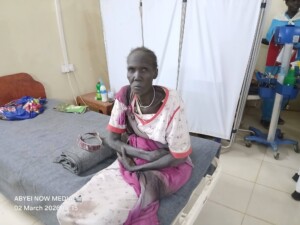‘Some progress’ in Sudan mediation as coup leader El Burhan pledges to release detainees
Reliable reports indicate ‘some progress’ in the mediation between the civilian transitional partners behind Prime Minister Abdallah Hamdok, and the leaders of the military coup led by Gen Abdelfattah El Burhan, former chairman of Sudan’s Sovereignty Council, that seized power on October 25.
 Gen Abdelfattah El Burhan (File photo: SUNA)
Gen Abdelfattah El Burhan (File photo: SUNA)
Reliable reports indicate ‘some progress’ in the mediation between the civilian transitional partners behind Prime Minister Abdallah Hamdok, and the leaders of the military coup led by Gen Abdelfattah El Burhan, former chairman of Sudan’s Sovereignty Council, that seized power on October 25.
Dozens of people, including lawyers, politicians, government officials and professionals have been arbitrarily detained, and some allegedly tortured, in an ongoing campaign against revolutionaries across Sudan by army and militia forces since the coup began.
The South Sudan Minister of Foreign Affairs Mayiik Ayii Deng, who is part of a mediation delegation that arrived in Khartoum on Sunday, says in a press statement issued on Wednesday that Gen El Burhan has agreed to release political detainees in Sudan within 24 hours.
The agreement by El Burhan follows the statement by the office of Prime Minister Abdullah Hamdok, who remains under house arrest, that he “still adheres to the conditions for releasing all detainees and restoring constitutional institutions prior to October 25, before engaging in any dialogue.”
The delegation from South Sudan arrived in the country on Sunday, on an official visit for several days, to invite the Sudanese leadership “to enter into a comprehensive dialogue with various political forces, to overcome all challenges and find an urgent solution to all the issues facing Sudan”.
The delegation includes the Advisor to the President of South Sudan for Security Affairs and head of the Juba mediation team, Tut Galuak, accompanied by the South Sudanese Minister of Foreign Affairs, Mayiik Ayii Deng, and Minister of Investment Dhieu Mathok.
In a press statement upon their arrival, Deng affirmed the belief of the South Sudan in the necessity of stabilising the situation in Sudan, as “this would reflect on the countries of the region”.
He added that the delegation carries a message from President Salva Kiir Mayardit, inviting the Sudanese leadership to enter into a comprehensive dialogue.
The government of South Sudan announced, on Sunday, the suspension of the export of its crude oil through the port of Port Sudan due to the turbulent political situation in Khartoum.
Juba indicated that it will resume exporting after calm returns to the Sudanese streets.The process of oil production will continue, but it is the export that will stop,” said Michael Makuei Lueth, Minister of Information and Official Spokesperson for the Government of South Sudan.
In his statement on Wednesday, Deng said that they will continue their efforts to urge the parties to negotiate.
African Union
The High Representative of the Chairperson of the African Union Commission and the former President of Nigeria, Chief Olusegun Obasanjo, arrived in Khartoum on Wednesday morning, to discuss the current crisis in the country.
The Special Representative of the Secretary-General of the United Nations to Sudan and head of the United Nations Integrated Transition Assistance Mission in Sudan (UNITAMS), Volker Perthes, said in a post on his Twitter account, that he renewed his demand for the complete freedom of Prime Minister Abdallah Hamdok, and the release of detainees for political reasons, and indicated that he had requested to meet them.
Perthes, expressed during his meeting with a group of Sudanese journalists on Wednesday, his hope to reach an agreement on the main issues.
El Sudani newspaper quoted Perthes as saying that there are “semi-final” signs of resolving the crisis. “It seems to me that a cabinet consisting of technocrats will be appointed for the next government,” he reportedly said. He explained that “there is still a debate about the share of armed struggle movements in the next government, because they are represented by a military and political leadership in the government.”
He stressed that any initiative will not see the light if it does not include PM Hamdok, stressing that the latter is still the actual prime minister and has not resigned from his position.











 and then
and then